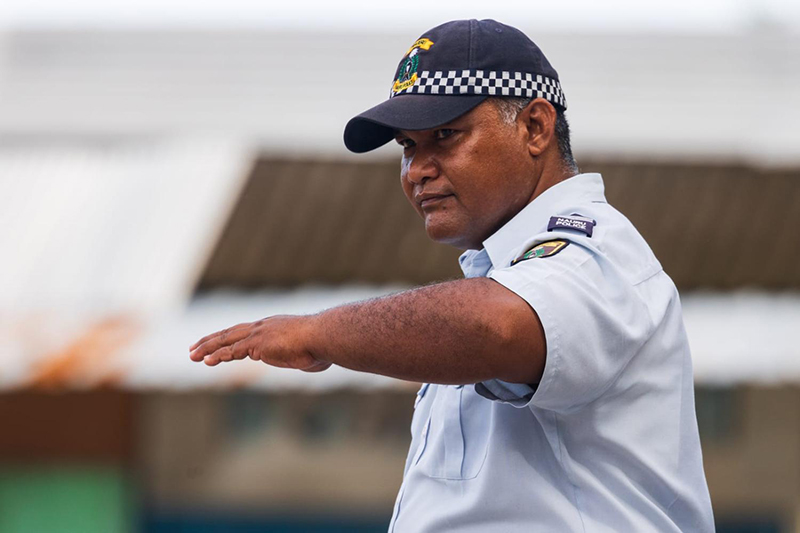Australia is preparing to establish a new training centre for Pacific police, described as a centrepiece for a new Pacific Policing Initiative with an estimated budget of more than $400 million.
The new plan also comes at a time when police organisations across the region are buckling under the pressures of strained resourcing for police workstations beyond major cities, inadequate numbers of officers and emerging crime and security threats.
There is no doubt police organisations across the region face pressing challenges, not only in traditional policing but in combating the transnational nature of crime, which demands internationally co-ordinated responses. But this new initiative has the potential to duplicate current efforts.
Moreover, the region desires to take a stronger lead on regional policing, leaving Australia’s planned establishment of a “sophisticated training facility” in Brisbane seemingly at odds with this objective.
Australia’s long history of providing policing capability assistance to the Pacific makes the move even more surprising. Australia already makes large investments in police organisations in Samoa, Solomon Islands and Fiji, for example. Australia liaison officers are also embedded in forces across the region.
It’s not clear how the proposed Australia-based training facility will fit with the investment in “centres of excellence” for police situated across the region. This includes Pacific-based and Australian-funded initiatives such as the $200 million investment in PNG for the establishment of a new police recruit and investigations training centre, the Blackrock Peacekeeping Camp in Fiji, and the $24 million investment in a Vanuatu-Australia Policing and Justice Program.
The new plan also comes at a time when police organisations across the region are buckling under the pressures of strained resourcing for police workstations beyond major cities, inadequate numbers of officersand emerging crime and security threats.
Recruitment, training and retention continues to be a major issue, compounded by the high turnover of trained senior officers. Across the region, there is strong demand to upgrade, expand and in some cases establish local training academies, rather than send scarce officers offshore.
More sustainable options
Gaps in policing need local commitment and partners in support, not external band aids. In most Pacific Island countries, there seems to be a disconnect between organisational priorities and the funding allocations for capacity building.
A range of “initiatives” have ended up on the shelf and several training programs are unable to be sustained because of a lack of locally assigned personnel.
The sole Pacific policing degree program at the University of the South Pacific is on the verge of being shelved due to underfunding, undersubscription and a breakdown in collaboration with the regional body that represents Pacific police organisations.
Countries without local training facilities continue to rely on support from neighbours for recruit training and ad hoc international offerings to upskill officers.
Pacific tertiary education providers must be engaged, including in the curriculum design of training programs, alignment within larger security frameworks, establishing quality assurance measure, and ensuring the overall contextual applicability and sustainability of such offerings within the region.
As Australia progresses plans for a new training facility, the sole Pacific policing degree program at the leading regional university, the University of the South Pacific, is on the verge of being shelved due to underfunding, undersubscription and a breakdown in collaboration with the regional body that represents Pacific police organisations.
Whether one of the planned “centres of excellence” mentioned as part of Australia’s policing plan will be based at the University of the South Pacific or another national tertiary education provider remains to be seen.
An investment in specialised training units embedded in national police academies across the region would likely be a more sustainable option. Such an initiative could also provide a hub for the slate of ad hoc policing programs rolled out for Pacific participants with limited accessibility options and high costs.
While a regional program seems sensible in theory, such an initiative will prove far less effective without regional buy-in. The Pacific Peacekeeping Hub in Fiji provides useful lessons about a mismatch between a well-intentioned, well-funded capacity building vision and the reality of its underutilisation.
Developing local capacity
Replicating existing programs is unlikely to serve the long-term interests of the region. A police program with such a significant price tag should demonstrate more than ‘good intentions’ before receiving sign off from decision makers.
Any initiative intended to build policing capacity needs to reflect an awareness of the constraints on regional police organisations to release officers for extended training periods.
When training does occur internationally, it should include a funded train-the-trainer component to support the development of local capacity for further knowledge transmission. The cost of accessing such training opportunities beyond the allocated funding period also needs to be considered.
The changing security landscape and the constant need for individuals to fill ranks within law enforcement organisations require countries to rethink training and capacity building plans, to partner with key stakeholders from beyond law enforcement, and to support the development and implementation of sustainable training initiatives.
As analysts such as Jose Sousa-Santos and Steven Ratuva have observed, replicating existing programs is unlikely to serve the long-term interests of the region. A police program with such a significant price tag should demonstrate more than “good intentions” before receiving sign off from decision makers.
This article first appeared on the Lowy Interpreter website, and is republished with permission; you can read the original here.
About the Author
 Danielle Watson is an Associate Professor and Research Training Co-ordinator in the School of Justice at Queensland University of Technology. Her research focuses on Pacific regional security, border security, policing, police/community relations, policing culturally and linguistically diverse communities, and plural regulatory systems in the Caribbean and Pacific. Danielle conducts research on (in)security in Pacific Island countries, capacity building for security service providers, recruitment and training, and many other areas specific to improving security governance in developing country contexts. Her research interests are multidisciplinary in scope as she also conducts research geared towards the advancement of tertiary teaching and learning.
Danielle Watson is an Associate Professor and Research Training Co-ordinator in the School of Justice at Queensland University of Technology. Her research focuses on Pacific regional security, border security, policing, police/community relations, policing culturally and linguistically diverse communities, and plural regulatory systems in the Caribbean and Pacific. Danielle conducts research on (in)security in Pacific Island countries, capacity building for security service providers, recruitment and training, and many other areas specific to improving security governance in developing country contexts. Her research interests are multidisciplinary in scope as she also conducts research geared towards the advancement of tertiary teaching and learning.
Picture © Sam Price / Australian Defence Department


